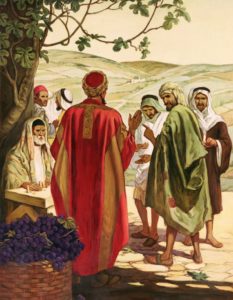Gospel Thought for Today
19th August Wednesday of the 20th Week in Ordinary Time
Gospel: Matthew 20:1-16
Jesus told his disciples this parable:
“The Kingdom of heaven is like a landowner
who went out at dawn to hire laborers for his vineyard.
After agreeing with them for the usual daily wage,
he sent them into his vineyard.
Going out about nine o’clock,
he saw others standing idle in the marketplace,
and he said to them, ‘You too go into my vineyard,
and I will give you what is just.’
So they went off.
And he went out again around noon,
and around three o’clock, and did likewise.
Going out about five o’clock,
he found others standing around, and said to them,
‘Why do you stand here idle all day?’
They answered, ‘Because no one has hired us.’
He said to them, ‘You too go into my vineyard.’
When it was evening the owner of the vineyard said to his foreman,
‘Summon the laborers and give them their pay,
beginning with the last and ending with the first.’
When those who had started about five o’clock came,
each received the usual daily wage.
So when the first came, they thought that they would receive more,
but each of them also got the usual wage.
And on receiving it they grumbled against the landowner, saying,
‘These last ones worked only one hour,
and you have made them equal to us,
who bore the day’s burden and the heat.’
He said to one of them in reply,
‘My friend, I am not cheating you.
Did you not agree with me for the usual daily wage?
Take what is yours and go.
What if I wish to give this last one the same as you?
Or am I not free to do as I wish with my own money?
Are you envious because I am generous?’
Thus, the last will be first, and the first will be last.”
The Gospel of the Lord.
The Mass intention is for Rosemary, Mike Sanderson and all their family.
Reflection:
In today’s Gospel, Jesus tells the parable of a landowner searching for workers to his vineyard. It seems that his vineyard is vast, and the harvest is rich because he kept on hiring workers even until five in the afternoon. When it was time to pay the workers, those who worked first complained that they received the same wage as those who worked only for an hour. If we put this in our world’s context, those workers who “bore the day’s burden and the heat” would seek redress for the landowner’s unjust practice. However, the parable is in a different domain. It refers to God’s Kingdom, to how God operates. “For my thoughts are not your thoughts, neither are your ways my ways, declares the Lord” (Isaiah 55:8-9).
This parable is like that of the Prodigal Son (Luke 15:11-32). Remember what the father did when his prodigal son returned home? He threw a party for him, didn’t he? And like the disgruntled workers in today’s Gospel, the older loyal son was not happy with the father’s graciousness. When confronted, the father said to the older son: “we had to celebrate and be glad, because this brother of yours was dead and is alive again; he was lost and is found’” (Luke 15:32). This response has a franker equivalent in today’s Gospel: “Are you envious because I am generous?” (Matthew 20:15). God’s mercy (as represented by the workers’ wage, and the party organised for the prodigal son) is immeasurable. It is freely given to everyone, regardless if one has followed God all through their lives or has just decided to do so today. In God’s eyes, there are no late bloomers.
- What makes you envious of others?
- How do you regard any lapsed Catholics, non-Catholics, families in irregular unions, ethnic minorities, LGBTQs, outcasts, etc. worshipping in our church?
- In the UK, those living in deprived areas have been hardest hit by the pandemic. How do you mirror the Lord’s generosity to them?
Lord Jesus, thank You for Your Word today. Thank You for Your overflowing mercy. May it wash us clean of envy so that we can be merciful as You are merciful. Amen.
Fraternally,
Pietro

